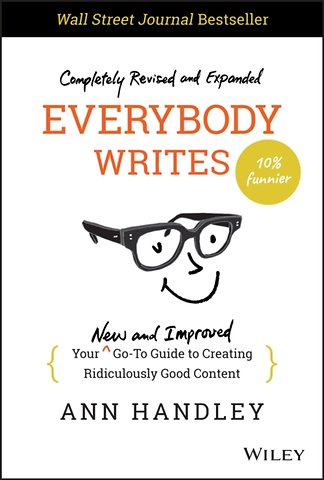

Ann Handley is the Chief Content Officer of MarketingProfs, a training and education company with the largest community of marketers in its category, and co-founded ClickZ.
Meer over Ann HandleyEverybody Writes
Your New and Improved Go–To Guide to Creating Ridiculously Good Content
Gebonden Engels 2022 2e druk 9781119854166Samenvatting
A hands-on field guide to consistently creating page-turning content that your audience loves. (And that delivers real results.)
In the newly revised and updated edition of Everybody Writes, marketer and author Ann Handley improves on her Wall Street Journal bestselling book that's helped hundreds of thousands become better, more confident writers. In this brand-new edition, she delivers all the practical, how-to advice and insight you need for the process and strategy of content creation, production, and publishing.
This new edition also includes: All-new examples, tools, resourcesUpdated step-by-step writing frameworkAdded and expanded chapters that reflect the evolution of content marketing (and evolution of Ann's thinking about what works today)The same witty and practical how-to approachHow to attract and retain customers with stellar online communicationHow to choose your words well, sparingly, and with honest empathy for your customersBest practices and ideas for crafting credible, trustworthy content "Things Marketers Write": The fundamentals of 19 specific kinds of content that marketers like you writeInspiration. Confidence. Fun.
In this book, you'll discover: Content marketing has evolved. Yet writing matters more than ever. In this new edition of Everybody Writes, you'll find the strategies, techniques, tips, and tools you'll need to refine, upgrade, and (most of all) inspire your own best content marketing.
Specificaties
Lezersrecensies
Anderen die dit boek kochten, kochten ook
Rubrieken
- advisering
- algemeen management
- coaching en trainen
- communicatie en media
- economie
- financieel management
- inkoop en logistiek
- internet en social media
- it-management / ict
- juridisch
- leiderschap
- marketing
- mens en maatschappij
- non-profit
- ondernemen
- organisatiekunde
- personal finance
- personeelsmanagement
- persoonlijke effectiviteit
- projectmanagement
- psychologie
- reclame en verkoop
- strategisch management
- verandermanagement
- werk en loopbaan





